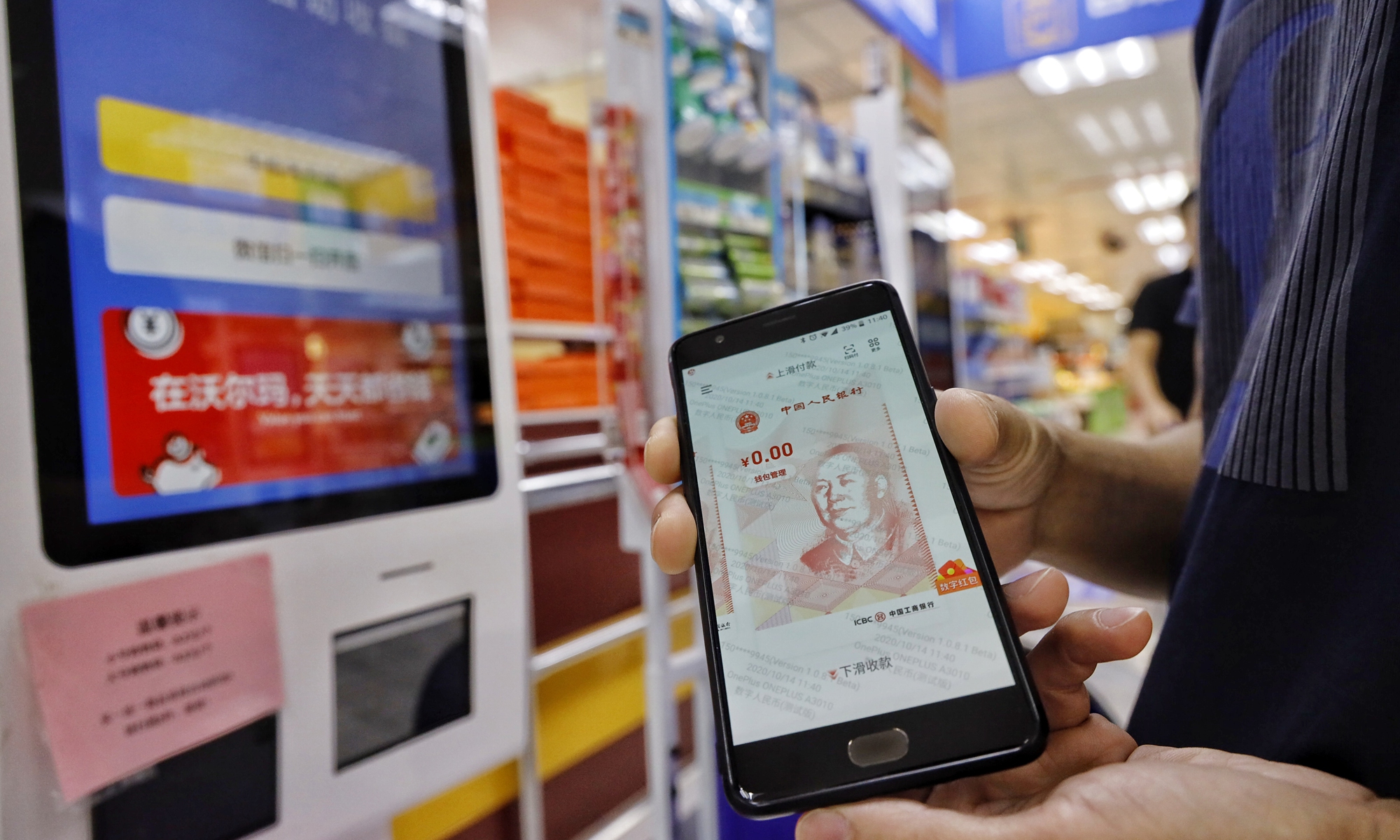Double 12 festival sees nearly 20,000 transactions via digital yuan on JD.com
By Xie Jun Source: Global Times Published: 2020/12/13 19:23:40
Digital yuan gets e-commerce trial during Double 12

Residents who received "red packets" of digital RMB use the money in stores in Shenzhen, Guangdong Province, on Wednesday. The city launched a pilot program to distribute 10m yuan ($1.49m) in the form of digital currency to residents on Monday.Photo:Li Hao/GT
Nearly 20,000 transactions were paid for with digital yuan within 24 hours after 8 pm Beijing time on Friday on JD.com, as Chinese residents actively participated in a major real-world trial of the digital yuan in Suzhou, a city in East China's Jiangsu Province, which has been at the forefront of China's push for a digital currency.
The Chinese e-commerce giant became the country's first online platform to accept China's digital currency, after the Suzhou municipal government handed out 100,000 virtual red packets of 20 million yuan ($3 million) in total to local residents via a lottery, in order to encourage spending on the Double Twelve shopping festival on Saturday, another major online shopping spree in addition to the Double 11 festival. The red packets will be valid until December 27.
According to information disclosed by JD Digits, JD.com's fintech arm, the first digital yuan transaction on the platform was made by a post-90 consumer in Suzhou at two seconds after 8 pm on Friday. It took the customer only about 0.5 seconds to complete the payment.
The company also disclosed that nearly 80 percent of the digital currency transactions were made by the younger generation - the post 80s and 90s - and the largest online payment exceeded 10,000 yuan.
Besides JD.com, about 10,000 physical shops in Suzhou participated in the trial.
This promotion in Suzhou is considered another step forward in China's effort to popularize the digital yuan as it strives for a cashless society. In October, Shenzhen issued 50,000 digital red packets each containing 200 yuan to local residents, a campaign that attracted over 47,000 consumers to spend 8.8 million yuan using the digital yuan in the week-long trial.
Cao Yin, managing director of the Shanghai-based Digital Renaissance Foundation, said that the People's Bank of China (PBC), the central bank, might have tried to model promotion for the digital yuan after that of the WeChat red packet, as the PBC is relying on social networking to promote the digital currency.
"As far as I know, the PBC is also hiring talent from a lot of private digital currency firms and internet companies to develop the digital currency. It hopes to implement the digital yuan using market-oriented means," he said.
Despite China's proactive means of testing the currency, Cao said that the speed of implementation has been "cautious" instead of hasty.
"In 2021, China will continue to look for more scenarios to test the digital yuan, but an extensive launch is still unlikely," Cao said, adding that once the currency is launched, it will be extremely difficult to retrieve it from users or ban its usage if any problems occur. It might also trigger attacks from some hostile organizations or countries. Therefore, the government will put the currency under stringent, repeated tests to make sure it can be safely issued.
Dai Xianglong, former head of the PBC, disclosed in a recent speech that China is ready to use the digital currency at the 2022 Winter Olympic Games.
Cao also predicted that China may implement the digital currency on a massive scale around 2023.
"China should be the first country to launch a digital currency, while countries like the US are looking to summarize China's experience and avoid risks. In a sense, we have only ourselves to compete with on this matter, and there's no need to rush it," Cao said.
Newspaper headline: Digital yuan gets e-commerce trial during Double 12
Posted in: ECONOMY,BIZ FOCUS